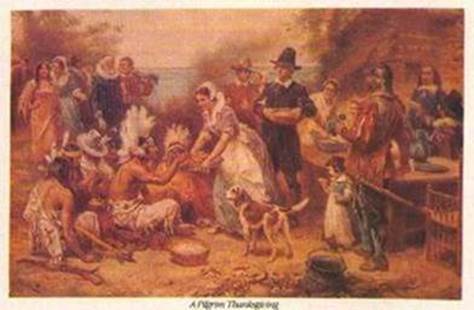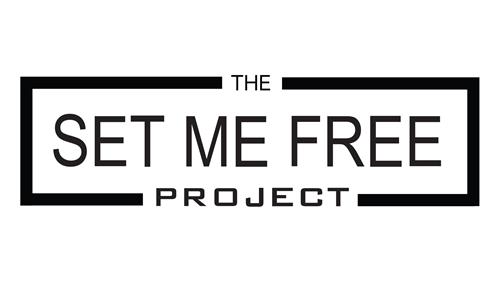REFLECTIONS ON THANKSGIVING
By Jim Meier (revised November 2015)

In the early part of the 17th Century, a group of English religious dissenters received a patent from the Virginia Company of England to settle in Virginia. Separatists from the established Church of England, these religious pilgrims were enticed to the new land by the promise of religious freedom. They set out on their chartered ship, the Mayflower, September 6, 1620. The ship was 90 feet long and 26 feet wide and carried 103 men, women and children in conditions of overcrowding, damp, discomfort and cold.
They spotted land in November, but it was early December before they actually set foot on land. Somehow they had miscalculated; they were far north of Virginia. They had landed near what is today Provincetown, Massachusetts.
It was too late to do anything about it. If you know anything about Decembers in New England, you know that cold grey weather had arrived and they barely had time to settle in before they would receive the full brunt of winter. Their first official act was to elect a Governor, and to sign the Mayflower Compact, which is still one of the great historical liberty documents, assuring government for and by the people, and religious freedom for all. Next, they divided themselves into 19 families and set out to build themselves homes and a hospital.
The hard voyage was followed by the harshest winter any of them had ever known, beyond the imagination of some, and the effects of inadequate housing and the shortage of proper food took their toll. A few natives had taken pity on them and shared some stored provisions. But the natives had not set aside nearly enough for more than 100 unexpected visitors, so it was a winter of deprivation for the settlers. For the last months of winter, all the Pilgrims were hungry, and many died. One hundred and three men, women and children had set out together on their long voyage to freedom. When the snow melted and the first signs of spring finally appeared, only 56 still stood together. They must have wondered what sort of future they could possibly have on this unforgiving new land.
During the first winter, the settlers had seen a few individual natives, and had seen some whole bands of natives in the distance, but mostly they had feared them and avoided contact. When spring came, they sought friendship with the natives, who seemed eager to meet them, and taught them their methods of survival. The natives introduced the settlers to corn, and gave them some of their stored supply. They taught them how to reinforce their homes and make them warmer and more suitable to this climate, how to plant and grow corn by putting kernels in the ground with a fish as fertilizer to make the corn grow healthy and tall, how to stalk wild turkey, wood pigeons, partridge, geese and ducks, how to catch and eat eels and clams, all of which were plentiful in this new land.
Imagine how it must have felt to not be hungry any more, to have a summer of plenty after that long winter of privation. The pilgrims, no doubt, were diligent students. They knew they had to learn now, while they were strong and the weather was warm, and do all that was necessary to store provisions and reinforce their settlement for the second winter.
How did they do, these sudden farmers? When all the work was done and autumn came, what kind of harvest did they have?
Reports on that vary. Some say that first harvest was sparse which would make sense, since the farmers were novices. Others say the pilgrims were astonished at the bounty this new land produced. Probably both reports are true. Future harvests must have produced more than the first one, as the settlers improved their agricultural skills and their understanding of the land. But no future harvest could have been more desperately needed or more appreciated than that first harvest.
That summer, the settlers signed a peace treaty with the natives, each promising to refrain from harming the other and to aid each other in times of trouble.
Later in the fall, the governor ordered a day of thanksgiving and issued an open invitation to the Indians. They were astounded when 90 came. To save their hosts embarrassment, they had brought along a large supply of oysters, corn, five deer, and cakes made of spiced, baked corn meal that many today call Indian pudding. Since the dinner guests contributed to the meal, this was perhaps the first American potluck, as well as the first Thanksgiving.
The celebration lasted three days. The first day was devoted entirely to eating. On the second and third day, the eating continued, of course, but then the serious play also began, as the two groups conducted races, wrestling matches, and contests of all kinds.
It must have been kind of sad when it all died down at the end of the third day, and the guests departed leaving once again a group of sixty men, women and children facing another long winter – only this time it would be different. This time they had provisions stored, an understanding of the land and new farming skills, which let them know they could survive.
What does this familiar story have to say to us today? 380+ years have passed since those settlers invited the Indians to a celebration of Thanksgiving. How much in common could our Thanksgiving possibly have with theirs, yours and mine, the one we’ll have on Thursday? In some ways, I think quite a bit. Many of us will have guests, sometimes unexpected ones, maybe “too” many. Our days too will be filled with the same activities of cooking and eating some of the same foods as they served nearly four centuries ago; turkey and squash, corn and pumpkin, perhaps even oysters in the stuffing, and for some, maybe even venison. Like them, we’ll enjoy the delights of fresh baked bread and pies. Our days too may be filled with relatives and children, arguments and amusements much like their races and wrestling, contests and noisy games, although ours may be in the form of TV football or video games.
And for us too there will finally come an end to the celebration, the guests will leave, and we will return to our normal lives, as we face the coming winter and the waning light.
There are also significant differences. The settlers had buried half their number in the months just before that Thanksgiving celebration; spouses, parents, neighbors, children. Survivors probably did not know why they had been spared when others were lost. When the warmth finally returned as they worked together and with the natives during that spring and summer, they must have thought about the coming winter. Who would survive this time? Would they lose more loved ones…or would it be their turn to die?
Imagine their growing joy as they saw the bounty this new land provided, as they preserved foods for winter and watched their storerooms fill, and as they made their homes more safe and warm. When the cool of autumn came it was without the same deadly threat of the year before. There would be plenty; enough to share. What great relief must have accompanied that three-day celebration. What enormous gratitude they must have felt.
It is difficult to imagine-what it was like for those settlers to be so completely dependent upon the work of their own hands and the gifts of their little piece of land and sea. For them it was clear: a harvest meant life.
We live in a time and place of plenty even in what we would call hard times. People like us, at least most, who can drive to a grocery store to buy a turkey, cranberry sauce, bread, lettuce and oranges in February cannot really know the hardship and challenges the Pilgrim’s endured.
What we can do is:
- Give thanks to the Pilgrims for their courage and resiliency. Their breaking ground and staying put laid the foundation for our founding fathers to build upon.
- Whine much less about this and that and be much more thankful for what we have
…especially as we witness from afar hundreds of thousands of refugee; desperate people on their own pilgrimage to stay alive and find a semblance of life’s most basic needs.
…especially as we witness the EVIL unleashed upon others, killing people they don’t even knowat schools, theaters, churches, concerts, stores and on streets. Be like
- Those Indians who reached out to others in times of need with generous acts of kindness and sharing.
- Find joy in life’s simple things. The prism in my office window is an examples for me.
- Forever stoke the fire of hope in ourselves and share burning embers from your flame with others who’s hope fire flickers low; nearly extinguished
May this Thanksgiving bring you, your families and friends a cornucopia of life’s most cherished gifts:
Love Hope Peace Happiness Learning Laughter Kindness.
In Your fallen heroes name,
-Blessings, Jim Meier
P.S. Feel free to share with your family, friends and others








